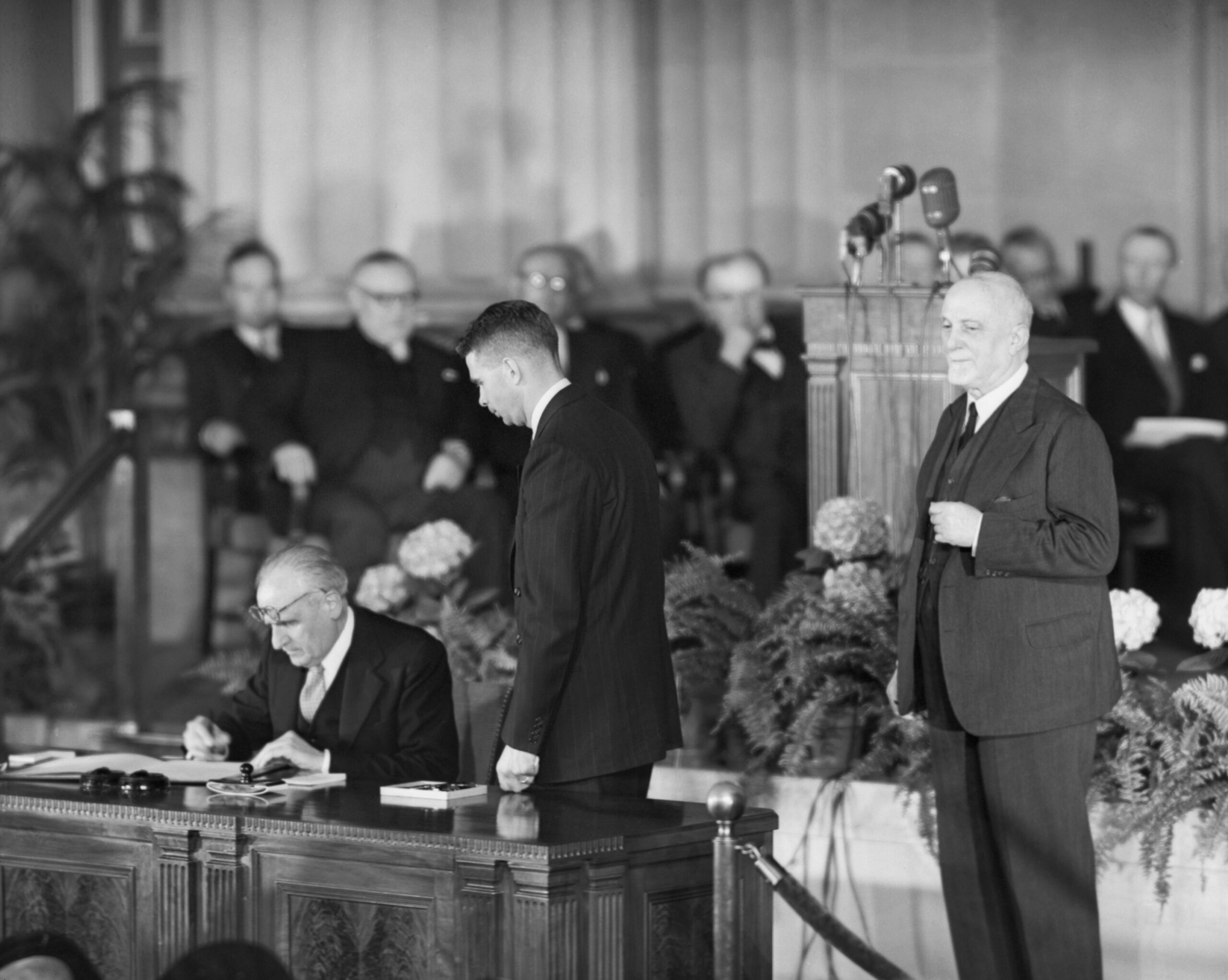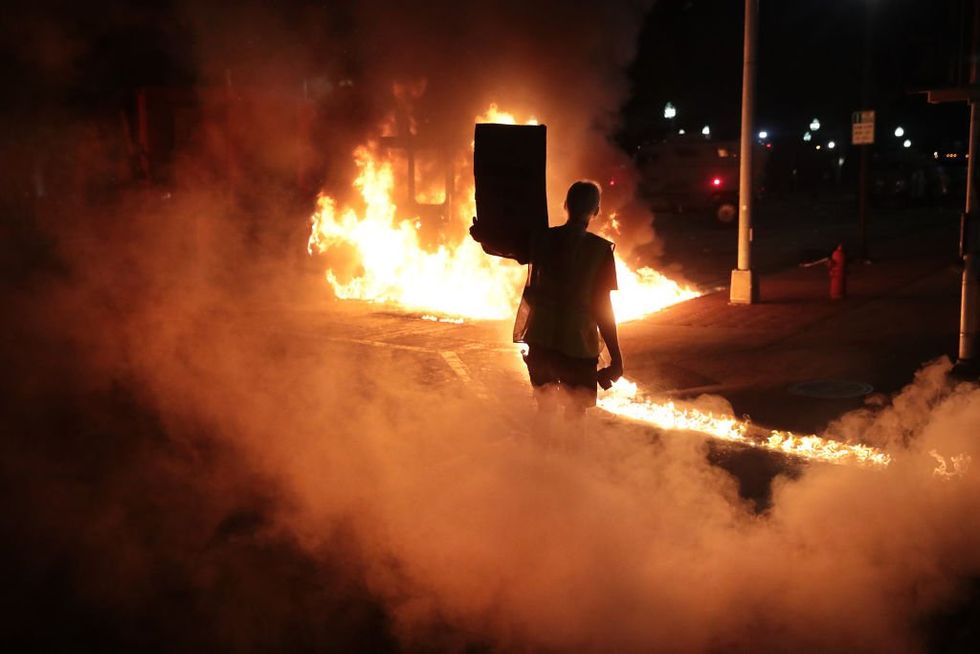
This article was originally published on American Conservative. You can read the original article HERE

On April 11, 1949, the “National Affairs” section of TIME led with a story titled “A Simple Document.” The report quoted President Harry Truman’s remarks to the dozen plenipotentiaries gathered in Washington to sign the North Atlantic Treaty. The president observed, “What we do here is a neighborly act. We are like a group of householders, living in the same locality, who decide to express their community of interests by entering into a formal association for their mutual self-protection.”
Below these words ran two political cartoons, the first depicting an anthropomorphized globe resembling Truman’s determined, if bandaged, face. Extending from the rondure, an arm flexed a chiseled bicep reading “Atlantic Pact.” Light beamed from the taut muscle like rays of sunshine. Beside this ran a sketch of national caricatures—the Canadian Mountie and Uncle Sam among their more effete and feminized European counterparts—huddled within a perimeter of barbed wire. Beside them, a gargantuan likeness of Joseph Stalin shrieked “Encirclement! Warmongers!” in the silent scream of ink on paper.
Not to be missed were the “chipping and chiseling” isolationists who groaned about the North Atlantic Pact and the multibillion-dollar extension of the Economic Cooperation Administration’s dispensation of the Marshall Plan. “Spending in Europe is no longer needed,” exclaimed Senator William Jenner. The story colorfully editorialized the Indianan’s “hoarse echo of the prewar days” as he thundered, “This so-called bipartisan foreign policy … leaves the Republican Party and the American taxpayer holding the bag.”
Seventy five years on, the emotional pageantry of the North Atlantic Treaty Organization carries forth. For many in Washington, the security collective remains the holy sacrament of transatlantic communion, worthy of something akin to religious devotion. A year before Vladimir Putin initiated his war of aggression against Ukraine, President Biden had already projected an “inflection point” in a Manichean clash between democracy and autocracy. He solemnly vowed that advancing democracy’s global standing was his administration’s “galvanizing mission.” The treaty has emerged as a convenient avatar for “our shared democratic values—and our willingness to stand for them.” This, Biden continued in a speech welcoming Sweden to the alliance, “is what makes NATO the greatest military alliance in the history of the world. It is what draws nations to our cause. It is what underpins our unity.”
These paeans to democracy ring inharmoniously abroad where even casual observers will recall a long and confounding history of support for autocrats both within and outside of the alliance. Consider that Portugal played host to the 1952 Lisbon meeting that welcomed Greece and Turkey into the alliance. At the time, the corporatist Estado Novo regime led by Prime Minister António de Oliveira Salazar was desperate to maintain its colonial holdings in Africa. With its security otherwise subsidized by wealthier Atlantic patrons, Portugal could prosecute its bitter “Overseas Wars” against proto-nationalist movements in Angola, Guinea-Bissau, and Mozambique.
The added irony of the Lisbon meeting is that those new members have wavered between democracy and authoritarianism in the intervening years. Where does President Recep Erdoğan stand on his American counterpart’s putative commitment to democratic values? This is to say nothing of Jens Stoltenberg’s recent visit to Riyadh—the first such visit by a sitting secretary general—to deepen NATO’s cooperation with Saudi’s absolute monarchy.
Any close examination of the alliance will reveal deep and persistent fault lines. The putative leader of the GOP, former President Donald Trump, routinely summons his inner William Jenner, warning America’s European allies to pay up. In a recent interview with Brexit figurehead Nigel Farage, Trump served notice: “NATO has to treat the U.S. fairly, because if it’s not for the United States, NATO literally doesn’t even exist.” He continued, “We have an ocean in between some problems… We have a nice, big, beautiful ocean.” Trump added, caustically, “[NATO] is more important for [European countries], they will take an advantage.”
While the rhetoric may sound similar, the reality looks strikingly different.
In 1949, Europe lay in ruins. The continent’s collective economy had collapsed with some 70 percent of its industrial infrastructure left smoldering. Aerial bombing and the barrage of artillery had laid waste to its cities and towns. Bridges and railroads were flattened. Farmlands were scorched. For the second time in half a century, the butcher’s bill tallied a staggering toll in both military and civilian lives. Meanwhile, the Soviet Union menaced Western Europe, threatening both an alternative socioeconomic order and military predation of unknown territorial ambition.
Today, Europe is wealthy, populous, and solidified as a leading supranational political and economic union. By any conceivable standard, the continent and its constituent states rank among the most developed on the planet. The one metric where it falls short is military capability, long content to skimp on defense spending while crouched comfortably behind a shield of American security.
Conditions in the United States have also changed. The United States emerged from the Second World War as an unparalleled economic powerhouse. America’s booming economy accounted for 50 percent of global GDP. The 1944 Bretton Woods agreement secured the U.S. dollar as the world’s principal reserve currency and Washington held 70 percent of the world’s gold reserves.
These days, the U.S. economy remains the world’s largest. However, its public debt has surged past $34 trillion while its debt-to-GDP ratio stands at 123 percent. So, while flush, it is unlikely the U.S. will ever enjoy the incomparable economic advantage it commanded after World War II. The matter of this relative decline manifests the rhetorical faceoff between Joe Biden’s “Build Back Better” and the MAGA politics of his predecessor. It also compels important strategic tradeoffs and will likely determine America’s long-term approach to its European commitments.
Last August, the Editorial Board of the Washington Post pronounced “How to Safeguard NATO from the Trump Threat.” Perhaps unwittingly, the authors acknowledged, “With U.S. participation, NATO is the most powerful military bloc in human history. Without the United States, it is a leaderless shell.” For all the compass rose bunting lying about the Beltway and Brussels, this statement of fact does not describe an actual military alliance. On the contrary, it illustrates a collective security dependance potentially composed of discrete liabilities rather than net assets. This paradox reveals itself whenever a European leader expounds on the essential value they provide the alliance—an insistence that climaxed after 9/11 when NATO adopted an expeditionary posture in Iraq and Afghanistan—before exhorting the Yanks to stay forever lest the entire arrangement collapse.
This is not a novel complaint. Rather, it echoes the familiar refrain of every American president of the postwar era: It is time for Europe to step up its commitment to continental defense.
In January 1951, TIME reported on the “Old Soldier” Dwight D. Eisenhower as he assumed the post of NATO’s first Supreme Allied Commander. While preparing to embark on a preliminary fact-finding trip to Europe, the coverage revealed, Ike “soberly introduced the point that he would have to make time after time in his tour of the NATO capitals: ‘Unless every sacrifice made by America is matched by equal sacrifices, equal sincerity of purpose in the Western European nations, this thing cannot win.’”
Many of the movers and shakers present at the creation of the alliance back in April of 1949 may have been delighted to learn that the treaty is set to celebrate its diamond anniversary. However, one may similarly assume that they would be shaken by the fact that, seven decades on, the treaty still swings in the balance of America’s domestic politics and our willingness to flex military muscle.
Subscribe Today
Get daily emails in your inbox
Ike’s admonition no longer applies. After four years of Trump, with another term looming, two years of war on the alliance’s perimeter, and multiplying threats coalescing from the Gaza Strip to the Taiwan Strait, Europe cannot merely match America’s overstressed “sincerity of purpose.” They must do more. And they must do so now.
Fortunately, opportunities abound for NATO’s European and British members to shoulder additional burdens. This evolution may begin with increased defense spending but ultimately depends upon building additional military capability. At a minimum, NATO-Europe should be encouraged to increase its cooperative and cross-border arms production, expand its Rapid Response Force, and focus its deployments on the defense of Europe’s eastern flank rather than expeditionary missions that take the alliance out of area.
None of these prescriptions should be received as particularly provocative. However, they do demand the political willpower necessary to achieve some semblance of strategic autonomy commensurate with the continent’s wealth and latent capacity. Only then will the alliance meet the measure of its original intent.
This article was originally published by American Conservative. We only curate news from sources that align with the core values of our intended conservative audience. If you like the news you read here we encourage you to utilize the original sources for even more great news and opinions you can trust!










Comments